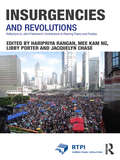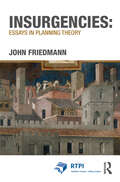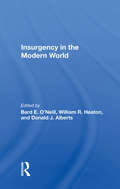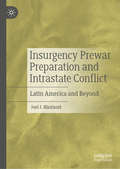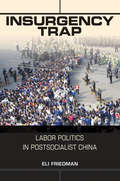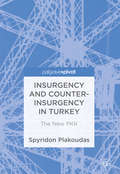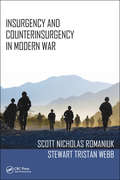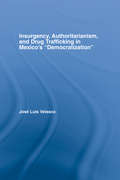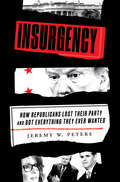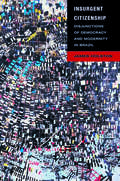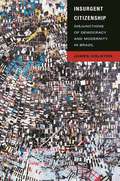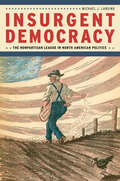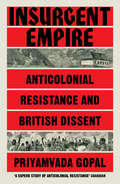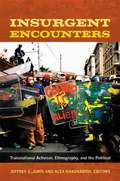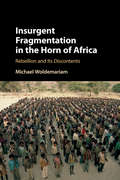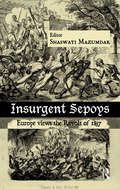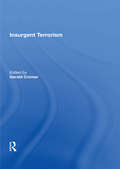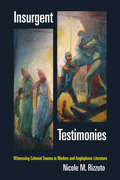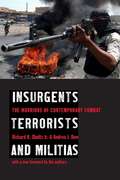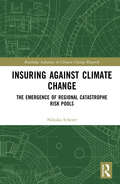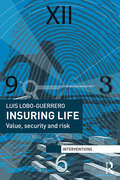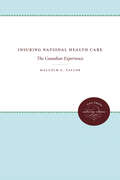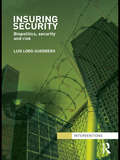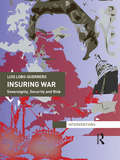- Table View
- List View
Insurgencies and Revolutions: Reflections on John Friedmann’s Contributions to Planning Theory and Practice (RTPI Library Series)
by Libby Porter Haripriya Rangan Mee Kam Ng Jacquelyn ChaseOver the past six or more decades, John Friedmann has been an insurgent force in the field of urban and regional planning, transforming it from its traditional state-centered concern for establishing social and spatial order into a radical domain of collaborative action between state and civil society for creating ‘the good society’ in the present and future. By opening it up to theoretical engagement with a wide range of disciplines, Friedmann’s contributions have revolutionised planning as a transdisciplinary space of critical thinking, social learning, and reflective practice. Insurgencies and Revolutions brings together former students, close research associates, and colleagues of John Friedmann to reflect on his contributions to planning theory and practice. The volume is organized around five broad themes where Friedmann’s contributions have risen to challenge established paradigms and generated the space for revolutionary thinking and action in urban and regional planning – Theorising hope; Economic development and regionalism; World cities and the Good city; Social learning, empowered communities, and citizenship; and Chinese cities. The essays by the authors reflect their engagement with his ideas and the new directions in which they have taken these in their work in planning theory and practice.
Insurgencies: Essays in Planning Theory (RTPI Library Series)
by John FriedmannFor nearly fifty years John Friedmann's writings have not just led the academic study of the discipline, but have given shape and direction to the planning profession itself. Covering transactive planning, radical planning, the concept of the Good City, civil society, rethinking poverty and the diversity of planning cultures, this collection of Friedmann's most important and influential essays tells a coherent and compelling story about how the evolution of thinking about planning over several decades has helped to shape its practice. With each essay given a new introduction to establish its context and importance, this is an ideal text for the study of planning theory and history.
Insurgency In The Modern World
by Bard E. O'Neill William R. Heaton Donald J. AlbertsWhile all instances of insurgency have elements in common, the circumstances that precipitate them and the forms they take vary immensely. The editors of this book synthesize the literature on insurgency to provide an analytical framework that outlines categories of insurgent movements (secessionist, revolutionary, restorational, reactionary, conse
Insurgency Prewar Preparation and Intrastate Conflict: Latin America and Beyond
by Joel J. BlaxlandThis book provides a new approach to explaining prolonged rebellions and insurgent wars, as well as a more nuanced and multi-faceted account of the entire lifespans of rebel and insurgent groups. Since 1945, rebel and insurgent groups have increasingly dragged larger, better funded, and ostensibly militarily superior regimes into protracted intrastate conflicts. This book demonstrates how they were able to endure the hardships of warfare thanks to decisions made before the conflict erupted––a period of time the author refers to as “incubation.” Using case studies on Latin American insurgencies, the author demonstrates that their capacity to endure was directly associated with both the length and quality of each group’s prewar preparations.
Insurgency Trap: Labor Politics in Postsocialist China
by Eli FriedmanDuring the first decade of the twenty-first century, worker resistance in China increased rapidly despite the fact that certain segments of the state began moving in a pro-labor direction. In explaining this, Eli Friedman argues that the Chinese state has become hemmed in by an "insurgency trap" of its own devising and is thus unable to tame expansive worker unrest. Labor conflict in the process of capitalist industrialization is certainly not unique to China and indeed has appeared in a wide array of countries around the world. What is distinct in China, however, is the combination of postsocialist politics with rapid capitalist development.Other countries undergoing capitalist industrialization have incorporated relatively independent unions to tame labor conflict and channel insurgent workers into legal and rationalized modes of contention. In contrast, the Chinese state only allows for one union federation, the All China Federation of Trade Unions, over which it maintains tight control. Official unions have been unable to win recognition from workers, and wildcat strikes and other forms of disruption continue to be the most effective means for addressing workplace grievances. In support of this argument, Friedman offers evidence from Guangdong and Zhejiang provinces, where unions are experimenting with new initiatives, leadership models, and organizational forms.
Insurgency and Counter-Insurgency in Turkey: The New Pkk
by Spyridon PlakoudasThis book seeks to answer the “why” and “how” questions about the insurgency of the PKK, a militant left-wing group of Turkey’s Kurds, in Turkey. The PKK has been inter-locked in an intermittent war against Turkey since 1984 in the name of Kurdish nationalism. The author combines insights of Strategy and IR - from strategy and tactics in irregular warfare to peace negotiations between state authorities and insurgents, with data from qualitative research, to achieve two inter-related objectives: first, assess the current state of affairs and predict the future course of the conflict and, secondly, draw general conclusions on how protracted conflicts can end and how.
Insurgency and Counterinsurgency in Modern War
by Scott Nicholas Romaniuk Stewart Tristan WebbA collection of original works covering all aspects of insurgency and counterinsurgency through a multinational lens, Insurgency and Counterinsurgency in Modern War addresses the need to look beyond the United States and other prominent counterinsurgency actors in the contemporary world. It addresses the need to look beyond the United States and other preeminent counterinsurgency actors in the contemporary world while reassessing some of the latent and burgeoning insurgent organizations and networks around the globe. It also suggests alternative approaches to understanding insurgency, counterinsurgency, and conventional and asymmetric warfare as they relate to insurgency and counterinsurgency.
Insurgency, Authoritarianism, and Drug Trafficking in Mexico's Democratization
by Jose L. VelascoMexico's "democratic transition" has created a competitive electoral system and a formally plural state. Besides, a peculiar wave of insurgency, started in 1994, has challenged the alleged moderating effect of democratic transition. This book argues that socioeconomic inequality is the main factor behind this combination of democratic and undemocratic trends.
Insurgency: How Republicans Lost Their Party and Got Everything They Ever Wanted
by Jeremy W. PetersHow did the party of Lincoln become the party of Trump? From an acclaimed political reporter for The New York Times comes the definitive story of the mutiny that shattered American politics.&“A bracing account of how the party of Lincoln and Reagan was hijacked by gadflies and grifters who reshaped their movement into becoming an anti-democratic cancer that attacked the U.S. Capitol.&”—Joe ScarboroughJeremy W. Peters&’s epic narrative chronicles the fracturing of the Republican Party. Insurgency is a fantasia-like story of a party establishment that believed it could control the dark energy it helped foment—right up until it suddenly couldn&’t. How, Peters asks, did conservative values that Republicans claimed to cherish, like small government, fiscal responsibility, and morality in public service, get completely eroded as an unshakable faith in Donald Trump grew to define the party?The answer is a tale traced across three decades—with new reporting and firsthand accounts from the people who were there—of populist uprisings that destabilized the party. The signs of conflict were plainly evident for anyone who cared to look. After Barack Obama&’s election convinced many Republicans that they faced an existential demographics crossroads, many believed the only way to save the party was to create a more inclusive and diverse coalition. But party leaders underestimated the energy and popular appeal of those who would pull the party in the opposite direction. They failed to see how the right-wing media they hailed as truth-telling was warping the reality in which their voters lived. And they did not understand the complicated moral framework by which many conservatives would view Trump, leading evangelicals and one-issue voters to shed Republican orthodoxy if it delivered a Supreme Court that would undo Roe v. Wade.In this sweeping history, Peters details key junctures and episodes to unfurl the story of a revolution from within. Its architects had little interest in the America of the new century but a deep understanding of the iron will of a shrinking minority. With Trump as their polestar, their gamble paid greater dividends than they&’d ever imagined, extending the life of far-right conservatism in United States domestic policy into the next half century.
Insurgent Citizenship: Disjunctions Of Democracy And Modernity In Brazil (In-formation Ser.)
by James Holston<P>Insurgent citizenships have arisen in cities around the world. <P>This book examines the insurgence of democratic citizenship in the urban peripheries of São Paulo, Brazil, its entanglement with entrenched systems of inequality, and its contradiction in violence.<P> James Holston argues that for two centuries Brazilians have practiced a type of citizenship all too common among nation-states--one that is universally inclusive in national membership and massively inegalitarian in distributing rights and in its legalization of social differences.<P> But since the 1970s, he shows, residents of Brazil's urban peripheries have formulated a new citizenship that is destabilizing the old.<P> Their mobilizations have developed not primarily through struggles of labor but through those of the city--particularly illegal residence, house building, and land conflict. <P>Yet precisely as Brazilians democratized urban space and achieved political democracy, violence, injustice, and impunity increased dramatically.<P> Based on comparative, ethnographic, and historical research, Insurgent Citizenship reveals why the insurgent and the entrenched remain dangerously conjoined as new kinds of citizens expand democracy even as new forms of violence and exclusion erode it.<P> Rather than view this paradox as evidence of democratic failure and urban chaos, Insurgent Citizenship argues that contradictory realizations of citizenship characterize all democracies--emerging and established. <P>Focusing on processes of city- and citizen-making now prevalent globally, it develops new approaches for understanding the contemporary course of democratic citizenship in societies of vastly different cultures and histories.
Insurgent Citizenship: Disjunctions of Democracy and Modernity in Brazil (In-Formation)
by James HolstonInsurgent citizenships have arisen in cities around the world. This book examines the insurgence of democratic citizenship in the urban peripheries of São Paulo, Brazil, its entanglement with entrenched systems of inequality, and its contradiction in violence. James Holston argues that for two centuries Brazilians have practiced a type of citizenship all too common among nation-states--one that is universally inclusive in national membership and massively inegalitarian in distributing rights and in its legalization of social differences. But since the 1970s, he shows, residents of Brazil's urban peripheries have formulated a new citizenship that is destabilizing the old. Their mobilizations have developed not primarily through struggles of labor but through those of the city--particularly illegal residence, house building, and land conflict. Yet precisely as Brazilians democratized urban space and achieved political democracy, violence, injustice, and impunity increased dramatically. Based on comparative, ethnographic, and historical research, Insurgent Citizenship reveals why the insurgent and the entrenched remain dangerously conjoined as new kinds of citizens expand democracy even as new forms of violence and exclusion erode it. Rather than view this paradox as evidence of democratic failure and urban chaos, Insurgent Citizenship argues that contradictory realizations of citizenship characterize all democracies--emerging and established. Focusing on processes of city- and citizen-making now prevalent globally, it develops new approaches for understanding the contemporary course of democratic citizenship in societies of vastly different cultures and histories.
Insurgent Democracy: The Nonpartisan League in North American Politics
by Michael J. LansingIn 1915, western farmers mounted one of the most significant challenges to party politics America has seen: the Nonpartisan League, which sought to empower citizens and restrain corporate influence. Before its collapse in the 1920s, the League counted over 250,000 paying members, spread to thirteen states and two Canadian provinces, controlled North Dakota's state government, and birthed new farmer-labor alliances. Yet today it is all but forgotten, neglected even by scholars. Michael J. Lansing aims to change that. Insurgent Democracy offers a new look at the Nonpartisan League and a new way to understand its rise and fall in the United States and Canada. Lansing argues that, rather than a spasm of populist rage that inevitably burned itself out, the story of the League is in fact an instructive example of how popular movements can create lasting change. Depicting the League as a transnational response to economic inequity, Lansing not only resurrects its story of citizen activism, but also allows us to see its potential to inform contemporary movements.
Insurgent Empire: Anticolonial Resistance and British Dissent
by Priyamvada GopalUpsets received views to show how rebellious colonies changed British attitudes to empireMuch has been written on the how colonial subjects took up British and European ideas and turned them against empire when making claims to freedom and self-determination. The possibility of reverse influence has been largely overlooked. Insurgent Empire shows how Britain's enslaved and colonial subjects were not merely victims of empire and subsequent beneficiaries of its crises of conscience but also agents whose resistance both contributed to their own liberation and shaped British ideas about freedom and who could be free. This book examines dissent over the question of empire in Britain and shows how it was influenced by rebellions and resistance in the colonies from the West Indies and East Africa to Egypt and India. It also shows how a pivotal role in fomenting dissent was played by anti-colonial campaigners based in London at the heart of the empire.
Insurgent Encounters: Transnational Activism, Ethnography, and the Political
by Alex Jeffrey S. Juris KhasnabishInsurgent Encounters illuminates the dynamics of contemporary transnational social movements, including those advocating for women and indigenous groups, environmental justice, and alternative--cooperative rather than exploitative--forms of globalization. The contributors are politically engaged scholars working within the social movements they analyze. Their essays are both models of and arguments for activist ethnography. They demonstrate that such a methodology has the potential to reveal empirical issues and generate theoretical insights beyond the reach of traditional social-movement research methods. Activist ethnographers not only produce new understandings of contemporary forms of collective action, but also seek to contribute to struggles for social change. The editors suggest networks and spaces of encounter as the most useful conceptual rubrics for understanding shape-shifting social movements using digital and online technologies to produce innovative forms of political organization across local, regional, national, and transnational scales. A major rethinking of the practice and purpose of ethnography, Insurgent Encounters challenges dominant understandings of social transformation, political possibility, knowledge production, and the relation between intellectual labor and sociopolitical activism. Contributors. Giuseppe Caruso, Maribel Casas-Cortés, Janet Conway, Stéphane Couture, Vinci Daro, Manisha Desai, Sylvia Escárcega, David Hess, Jeffrey S. Juris, Alex Khasnabish, Lorenzo Mosca, Michal Osterweil, Geoffrey Pleyers, Dana E. Powell, Paul Routledge, M. K. Sterpka, Tish Stringer
Insurgent Fragmentation in the Horn of Africa: Rebellion and its Discontents
by Michael WoldemariamWhen insurgent organizations factionalize and fragment, it can profoundly shape a civil war: its intensity, outcome, and duration. In this extended treatment of this complex and important phenomenon, Michael Woldemariam examines why rebel organizations fragment through a unique historical analysis of the Horn of Africa's civil wars. Central to his view is that rebel factionalism is conditioned by battlefield developments. While fragmentation is caused by territorial gains and losses, counter-intuitively territorial stalemate tends to promote rebel cohesion and is a critical basis for cooperation in war. As a rare effort to examine these issues in the context of the Horn of Africa region, based upon extensive fieldwork, this book will interest both scholarly and non-scholarly audiences interested in insurgent groups and conflict dynamics.
Insurgent Sepoys: Europe Views the Revolt of 1857
by Shaswati MazumdarThe Revolt of 1857 in India has so far largely been viewed as an event that was of interest to British and Indian scholars investigating the various consequences of British colonial rule in India. What has remained out of the focus of study during the last 150 years is the possible impact of the Revolt elsewhere, its so to say international dimension: what, in particular, was the reaction in Europe where elemental social and political transformations were underway. Whatever the varied nature of the reactions, the space given to the Revolt in many European newspapers and journals while it was in progress is certainly extensive. What is more, representations of and reflections on the Revolt appeared both during the event and for long after its suppression, above all in forms of popular fiction but also in historical accounts, letters, reminiscences and other forms of writing. The collection of essays in this volume ventures into this unexplored terrain and offers a first look at some of these European responses.
Insurgent Terrorism (International Library Of Criminology, Criminal Justice And Penology - Second Ser.)
by Gerald CromerTerrorists engage in propaganda and rhetoric, even though they prefer the power of deed over word. They use a wide variety of mechanisms of moral disengagement to convince themselves of the rightness of their actions, a necessary prerequisite for taking up arms. The articles collected together in this excellent volume focus on the rhetoric and propaganda used by insurgent terrorists to justify their resort to violence. The volume includes a thoughtful introduction which summarizes the main findings of the literature, drawing attention to the many different kinds of terrorist propaganda and the underlying similarity between them.
Insurgent Testimonies: Witnessing Colonial Trauma in Modern and Anglophone Literature
by Nicole M. RizzutoDuring the second half of the nineteenth century and the first half of the twentieth, insurgencies erupted in imperial states and colonies around the world, including Britain’s. As Nicole Rizzuto shows, the writings of Ukrainian-born Joseph Conrad, Anglo-Irish Rebecca West, Jamaicans H. G. de Lisser and V. S. Reid, and Kenyan Ng gi wa Thiong’o testify to contested events in colonial modernity in ways that question premises underlying approaches in trauma and memory studies and invite us to reassess divisions and classifications in literary studies that generate such categories as modernist, colonial, postcolonial, national, and world literatures.Departing from tenets of modernist studies and from methods in the field of trauma and memory studies, Rizzuto contends that acute as well as chronic disruptions to imperial and national power and the legal and extra-legal responses they inspired shape the formal practices of literatures from the modernist, colonial, and postcolonial periods.
Insurgents, Terrorists, and Militias: The Warriors of Contemporary Combat
by Richard Shultz Jr. Andrea DewSince the end of the Cold War, conventional militaries and their political leaders have confronted a new, brutal type of warfare in which non-state armed groups use asymmetrical tactics to successfully fight larger, technologically superior forces. In order to prevent future bloodshed and political chaos, it is crucial to understand how these unconventional armed groups think and to adapt to their methods of combat.Richard H. Shultz Jr. and Andrea J. Dew investigate the history and politics of modern asymmetrical warfare. By focusing on four specific hotbeds of instability—Somalia, Chechnya, Afghanistan, and Iraq—Shultz and Dew conduct a careful analysis of tribal culture and the value of clan associations. They examine why these "traditional" or "tribal" warriors fight, how they recruit, where they find sanctuary, and what is behind their strategy. Traveling across two centuries and several continents, Shultz and Dew examine the doctrinal, tactical, and strategic advantages and consider the historical, cultural, and anthropological factors behind the motivation and success of the warriors of contemporary combat.In their provocative argument, Shultz and Dew propose that war in the post-Cold War era cannot be waged through traditional Western methods of combat, especially when friendly states and outside organizations like al-Qaeda serve as powerful allies to the enemy. Thoroughly researched and highly readable, Insurgents, Terrorists, and Militias examines how non-state armies fight, identifies the patterns and trends of their combat, and recommends how conventional militaries can defeat these irregular yet highly effective organizations.
Insurgents, Terrorists, and Militias: The Warriors of Contemporary Combat
by Andrea J. Dew Richard H. Shultz Jr.Since the end of the Cold War, conventional militaries and their political leaders have confronted a new, brutal type of warfare in which non-state armed groups use asymmetrical tactics to successfully fight larger, technologically superior forces. In order to prevent future bloodshed and political chaos, it is crucial to understand how these unconventional armed groups think and to adapt to their methods of combat. Richard H. Shultz Jr. and Andrea J. Dew investigate the history and politics of modern asymmetrical warfare. By focusing on four specific hotbeds of instability-Somalia, Chechnya, Afghanistan, and Iraq-Shultz and Dew conduct a careful analysis of tribal culture and the value of clan associations. They examine why these "traditional" or "tribal" warriors fight, how they recruit, where they find sanctuary, and what is behind their strategy. Traveling across two centuries and several continents, Shultz and Dew examine the doctrinal, tactical, and strategic advantages and consider the historical, cultural, and anthropological factors behind the motivation and success of the warriors of contemporary combat. In their provocative argument, Shultz and Dew propose that war in the post-Cold War era cannot be waged through traditional Western methods of combat, especially when friendly states and outside organizations like al-Qaeda serve as powerful allies to the enemy. Thoroughly researched and highly readable, Insurgents, Terrorists, and Militias examines how non-state armies fight, identifies the patterns and trends of their combat, and recommends how conventional militaries can defeat these irregular yet highly effective organizations.
Insuring Against Climate Change: The Emergence of Regional Catastrophe Risk Pools (Routledge Advances in Climate Change Research)
by Nikolas SchererThis book provides one of the first systematic in-depth studies on regional catastrophe risk pools. It explores the various goals of these new financial instruments, illustrating how they function on a conceptual, technical and practical level, and reconstructs their political genesis. With climate-related disasters increasing in frequency and severity, Insuring Against Climate Change explores how affected countries, especially those in the Global South, have increasingly turned to innovative index insurance instruments, as demonstrated by the creation of the Caribbean Catastrophic Risk Insurance Facility (CCRIF), the African Risk Capacity (ARC) and the Pacific Catastrophe Risk Assessment and Financing Initiative Facility (PCRAFI Facility). Scherer scrutinizes the formation of this trend, exploring comparatively the goals, characteristics and histories of these tools, and argues that their attractiveness rests more on political than economic benefits and is, in fact, more supply than demand-driven. Making a significant contribution to current debates on the opportunities and limitations of what are sometimes described as indirect ‘climate risk insurance’, this book will be of great interest to political scientists with an interest in insurance instruments and climate-related disaster management politics as well as to practitioners working in the insurance, finance and the development sectors.
Insuring Life: Value, Security and Risk (Interventions)
by Luis Lobo-GuerreroThis book is a contribution to the scholarly engagement with the wider problem of governing through risk and the politics of uncertainty. It takes life insurance as an empirical site from which to ask: what is the kind of governance created through insurance an instance of, and how does it contribute to the transcendence of liberalism? By making a distinction between capable life as object of insurance, and potential life as that which escapes its control, the book conducts a historical epistemological analysis of the problems of valuation, truth production, securitisation, classification, and gendering that constitute life insurance products and practices. Insuring Life offers a critical engagement with the epistemology of life insurance to demonstrate the unnecessary and precarious character of the conditions that make this instrument of liberal governance possible. It concludes that the transcendence of liberalism relies on the technological agency of these instruments and that its challenge begins by redefining the terms under which the potential of life, if invaluable, is to be thought as event. The book follows Insuring War as the third of a trilogy that analyses how concepts and practices of power, risk and security materialise in the form of insurance as a central instrument of governance in the liberal world. It will be of great use to scholars, researchers, and postgraduate students of political economy, critical security studies and political theory, the biopolitics of security and post-structural politics. Insuring War: https://www.routledge.com/products/search?keywords=insuring+war Insuring Security: https://www.routledge.com/Insuring-Security-Biopolitics-security-and-risk/Lobo-Guerrero/p/book/9780415522854
Insuring National Health Care: The Canadian Experience
by Malcolm G. TaylorTaylor gives a brief history, geared specifically to an American audience, of the evolution of the Canadian national health insurance system from the 1940s to the late 1980s. He describes the two Canadian programs -- hospital insurance and medical insurance -- and discusses the major changes in the programs since they were implemented.Originally published in 1990.A UNC Press Enduring Edition -- UNC Press Enduring Editions use the latest in digital technology to make available again books from our distinguished backlist that were previously out of print. These editions are published unaltered from the original, and are presented in affordable paperback formats, bringing readers both historical and cultural value.
Insuring Security: Biopolitics, security and risk (Interventions)
by Luis Lobo-GuerreroInsurance is the world’s largest economic industry, providing a form of security that more than triples global defence expenditure. However, little is know about the form of security insurance provides. This book offers a genealogical interrogation of the relationship between security and risk through its materialisation in insurance. This work seeks to argue that insurance practices ascribe value to life and in so doing produce a form of security central to the understanding of contemporary liberal governance and security. Lobo-Guerrero theorizes insurance as a biopolitical effect that results from the continuous interaction of an ‘entrepreneurial form of power’, and traditional forms of sovereign security. Through rich empirical cases and a unique theorization, the book breaks apart the traditional division between security studies, political economy and political theory. The author explores this theory in relation to specific issues such as the use of life insurance in the molecular age, the use of insurance to securitize against environmental catastrophic risk, specialist products such as kidnap and ransom insurance, as well as the use of insurance to counter maritime piracy in the twenty-first century. Providing an important and original contribution to the study of the biopolitics of security, this work will be of great interest to all scholars of security studies, international relations and international political economy. Insuring War: https://www.routledge.com/products/search?keywords=insuring+war Insuring Life: https://www.routledge.com/Insuring-Life-Value-Security-and-Risk/Lobo-Guerrero/p/book/9780415716079
Insuring War: Sovereignty, Security and Risk (Interventions)
by Luis Lobo-GuerreroInsurance is a central, if until now ignored, instrument of war in the modern period. Ever since the eighteenth century, interaction between governments and insurers in Western countries has materialised in the form of war risk schemes that have contributed to the waging of war and the preservation of peace. The operation of those schemes has given rise to a curious, if not innocent, association between practices of statehood and practices of risk, which are theorised here under the label of ‘insurantial sovereignty’. The book draws on the British experience of using maritime insurance as an instrument of war during the Napoleonic Wars, the two World Wars, and the early twenty-first century. It asks, what happens, when, under conditions of war, the sovereign adopts insurantial imaginaries and practices into its rationalities of government? In doing so the book makes a novel contribution to the understanding of liberal security and liberal governance which is central to the theory of Political Science and International Relations, the understanding of international political sociology, and international political economy. The book follows Insuring Security: Biopolitics, Security and Risk as the second of a trilogy that analyses how concepts and practices of power, risk and security materialise in the form of insurance as a central instrument of governance in the liberal world. Insuring Security: https://www.routledge.com/Insuring-Security-Biopolitics-security-and-risk/Lobo-Guerrero/p/book/9780415522854 Insuring Life: https://www.routledge.com/Insuring-Life-Value-Security-and-Risk/Lobo-Guerrero/p/book/9780415716079
